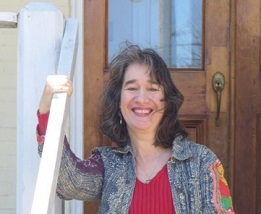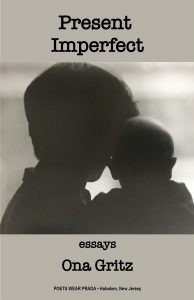Living Large: A Poet Finds a Second Home in Personal Essays
 “You’re a miniaturist,” the poet Molly Peacock told me years ago.
“You’re a miniaturist,” the poet Molly Peacock told me years ago.
In preparation for her Sunday afternoon workshop, she’d asked everyone to send her ten pages of work.
“We’re not here to discuss what’s wrong with our poems, or how to make them better,” Molly explained. “We’re here to discover our habits and proclivities. We’re here to learn what kind of poet each of us already is.”
There were narrative poets around that table, formalists, painterly impressionists. I was a miniaturist, not only because the poems I’d shared consisted of less than twenty lines, but because I like to hone in on minute details, study the particular, capture a single moment in time. As I walked to the train after class that day, I recalled my favorite room at the Brooklyn Museum as a child. It held tiny street scenes and doll-sized houses. Grooves and patterns carved into the delicate railings and standing streetlights.
Wrinkles and folds visible in the miniscule curtains and clothes. I’m a miniaturist, I thought. Like Emily Dickinson! It wasn’t a style I’d consciously adopted. Small poems were what came to me, or what remained after I edited my drafts. Now that Molly had named it, I felt like I’d been given a precious, if nearly invisible, key.
When, less than a year later, I felt pulled to tackle more complex topics and claim more space on the page, I knew poetry wasn’t the place for that work. As much as I admired layered, ambitious poems, I didn’t want to change my approach to the form.
For me, poetry has always been about close listening. It’s about the music and mouth feel of words. As Molly had noted, it’s about distillation and compression, writing just enough to uncover unexpected kernels of truth. This new need to explore wider terrain had nothing to do with my process as a poet. An entirely different genre had begun calling my name.
Once I grasped this, I didn’t just flirt with the idea of writing personal essays. I signed something akin to a marriage contract. I approached the editors of Literary Mama, an online journal where I’d published several poems, and proposed a monthly column.
My first essay began the way most poems do for me: with a feeling, an image, a germ of an idea. And as with poems, what kept me going as I wrote was language. The sound of certain words when placed beside others, a pleasing metaphor, a surprising turn of phrase. Unfortunately, when I came back to read my draft the next day, the sentences were pretty but didn’t add up to much. “What am I trying to say?” I wondered aloud and realized that asking this question so directly was new to me.
My poems, at their best, make associations, unearth meaning, shift in startling ways. But it mostly feels as though they do so without my bidding. That’s the magic. Born from a deeply internal place, poetry brings out knowledge I didn’t know I had. Prose, I began to learn as I reworked that essay and the next and the next, can hold that same magic. It can lift discoveries up from the unconscious. At the same time, it requires more of my conscious self. I have to take those flashes of insight that in poetry are the crux, the thing itself, and explore them more overtly. This requires being a kind of split self. Flawed protagonist, willing to show herself bumbling in the dark, and someone possibly no more than moments older, yet somehow wiser, attempting to make sense of it all.
I have never been a journal keeper, but I know many people who find the practice invaluable. Without it, these friends tell me, they wouldn’t understand their own minds. I’ve tried but have never stayed with a journal for more than a few entries. Somehow, whatever I wrote in those private notebooks seemed superficial and obvious.
But writing personal essays with an outside reader in mind feels different. From the very beginning it stretched me, the way we’re often our best, most astute selves when working something through with a friend. It has, with its own brand of magic, made me more self-aware and compassionate. After all, in nonfiction, just like in fiction, a protagonist has to evolve during the course of the telling. And since that protagonist is me, I’ve evolved with every experience I’ve examined on the page.
 My contract with Literary Mama was for a year, but I stayed with them for twelve, writing what became their longest running column. In that time, I kept writing poems, began writing essays for other venues, and published what might be considered a miniaturist’s memoir, the length of a novella. My new book is an essay collection, and when I sat down to put it together, I did so the way I’d curate a poetry reading: attending to connections, varying the texture, trusting my intuition.
My contract with Literary Mama was for a year, but I stayed with them for twelve, writing what became their longest running column. In that time, I kept writing poems, began writing essays for other venues, and published what might be considered a miniaturist’s memoir, the length of a novella. My new book is an essay collection, and when I sat down to put it together, I did so the way I’d curate a poetry reading: attending to connections, varying the texture, trusting my intuition.
Only afterwards, only now in fact, do I recall that when I arranged my poetry book Geode some years earlier, I did so chronologically, following a storyline, creating a personal narrative in poems. It seems the borders between my genres aren’t so deeply cut after all.
Let’s return to that room of miniatures now long gone from the Brooklyn museum. Hone in on the child mesmerized by bends in the branches of finger-sized maples, by the outfits on tiny figurines. Now zoom out to the woman I’ve become, the one watching and remembering the girl. She’s listening for language, starting to craft something out of the recollection, waiting to discover what form it will take.
—
Ona Gritz’s books include Present Imperfect: Essays, Geode, a Main Street Rag Poetry Book Award finalist, and On the Whole: a Story of Mothering and Disability. A longtime columnist at Literary Mama, Ona’s poems and essays have appeared in Ploughshares, The New York Times, River Teeth, The Bellevue Literary Review, Brevity, and elsewhere. Recent honors include two Notable mentions in Best American Essays, a Best Life Story in Salon, and a winning entry in The Poetry Archive Now: Wordview 2020 project.
https://onagritz.wordpress.com
Category: On Writing

























Thoughtful insights into process and the individuality that makes every poet her own “genre.” Small is beautiful, hurray for the miniaturists